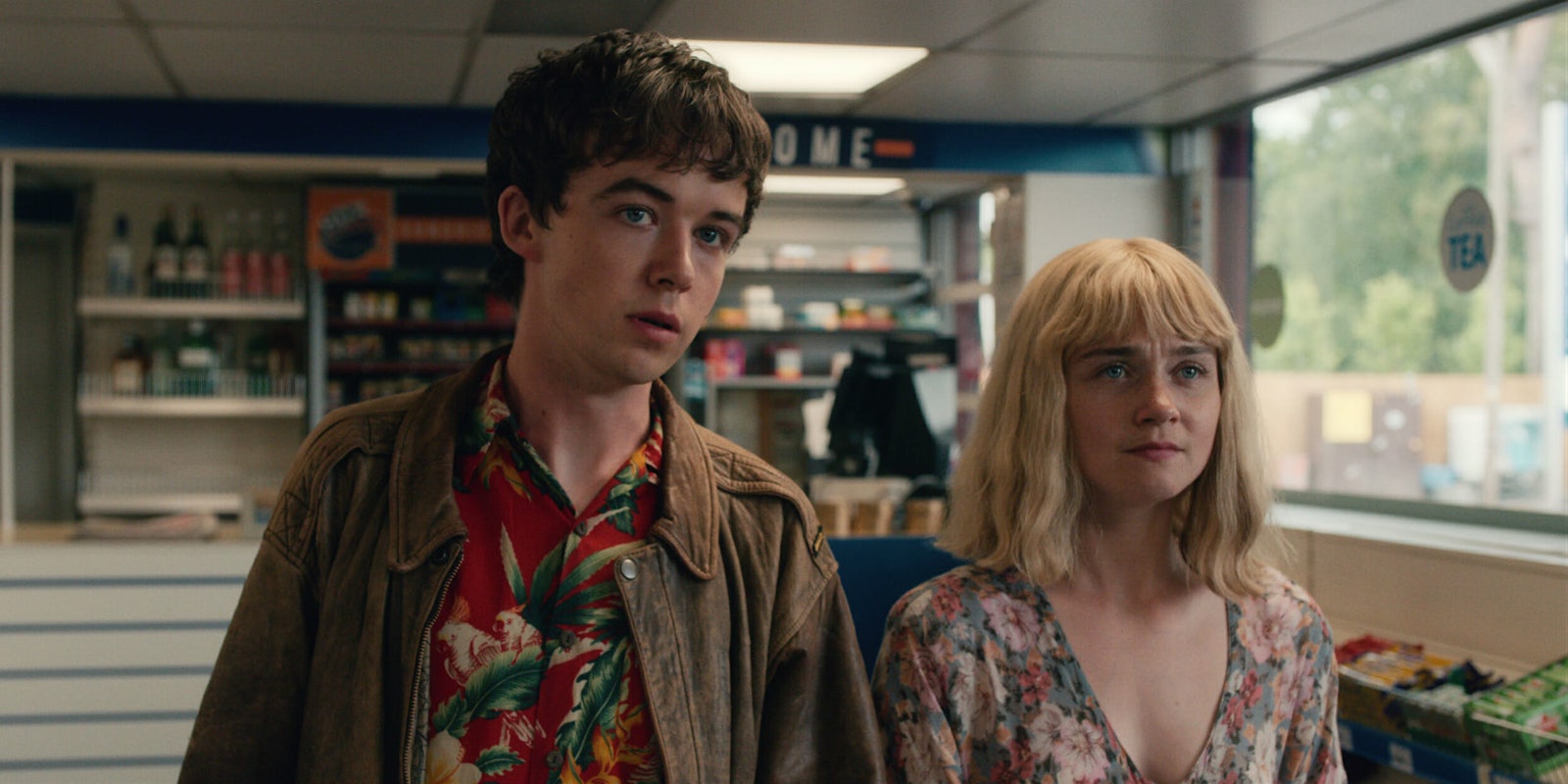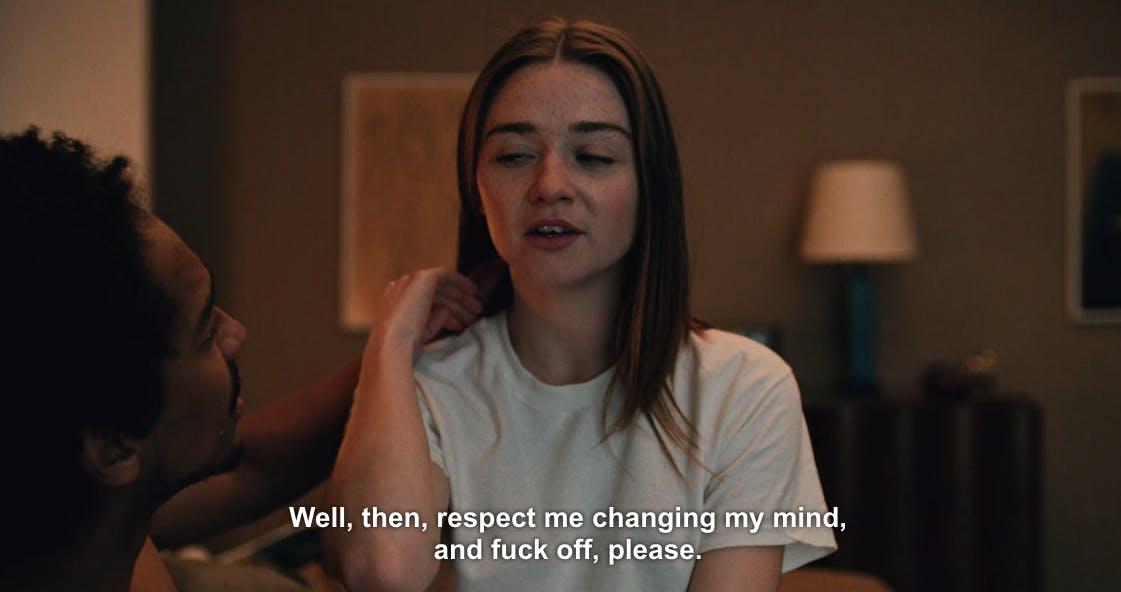Netflix’s new series The End of the F***ing World is a twist on the standard-issue teen love story: Boy meets girl, boy thinks about killing girl, girl makes him feel something other than murderous rage.
Based on Charles Forsman’s 2013 graphic novel of the same name, The End of the F***ing World has become a surprise hit for Netflix since debuting on Jan. 5. At one point it had a 100 percent rating on Rotten Tomatoes. The eight-episode series is a dark comedy but its shining center is the relationship between James (Alex Lawther) and Alyssa (Jessica Barden), two 17-year-olds who collide in a blur of angst. We’re told right away that James believes he’s a psychopath; he feels nothing and has murder on his mind. He sets his focus on classmate Alyssa, who is trying to escape a toxic home life and insults his skateboarding immediately upon meeting him. The two find a deeper connection in their dysfunction, but the show also offers a timely and important exploration of consent.
As we explore the blooming relationship between James and Alyssa, we see several moments where she is the aggressor, and he is tentative or unsure. She’s not afraid to express desire, even if she’s not sure what that means yet. There’s one scene in particular that sketches out exactly how consent should be expressed, especially in light of recent conversations about what it means and why it’s important.
“We didn’t want to make a show filled with teenagers taking their shirts off and just having sex,” series creator Jonathan Entwistle tells the Daily Dot. “That was quite important to us that we were looking at being a teenager and doing crazy stuff like they do, but doing it real.”
In episode 3, Alyssa meets a man named Topher (Alex Sawyer), after attempting to give James oral sex and being rebuffed. She brings him back to the random house she and James invaded after running away from their parents. It’s a move meant to make James jealous, but as they start making out, Alyssa isn’t feeling it and expresses that: “I changed my mind,” she says. “I’m sorry, I’m not into this.”
Topher engages in some mental gymnastics that many women will find familiar; tactics that are employed to make women feel guilty or doubt themselves.
Topher: Are you kidding?
Alyssa: Nope.
Topher: That’s not fair.
Alyssa: Uh, yes it is.
Topher: Please, Alyssa. I think you’re amazing.
Alyssa: Well then respect me changing my mind and fuck off, please.
That scene was in Forsman’s book, and Entwistle says the “spine of the show is basically the same.” But there were no big conversations about driving home the issue of consent. “It was what Charlie [Covell, writer of all eight episodes] wrote,” Entwistle says. “It was the way she wanted to get into what happens to Alyssa and James, to break them apart. The sex was something that Alyssa was always in control of, even when the whole world was out of control around them.”
There are smaller moments where consent is discussed. In one scene James lets a man who has given them a ride touch his penis while they’re in a public bathroom, even though he clearly doesn’t want to. Alyssa catches them, and later tells James: “You know that if people want to do stuff to you, you don’t have to let them.” In the final episode, James and Alyssa are on the run, their fates unsure. They finally start to get intimate, but Alyssa stops him and asks him to wait. He agrees. Through his relationship with Alyssa, James learns about his feelings—that he has them. He gives her the space to feel things too—to be a person and not just a vessel.
There are darker themes in the series. Alyssa’s stepdad is a creep and there are hints that he’s been inappropriate. When she and James squat at a professor’s house after running away from home, it’s revealed that he’s the true psychopath: The man has video and photo evidence of women he’s tortured and attempts to rape Alyssa when he finally discovers her in his house. (He finds out James is under the bed the hard way.)
Entwistle says the relationship between Alyssa and James is “weirdly spiritual” and he didn’t want them to just fall in love immediately. “We just felt that anything sexual was too easy to play straight,” he says. “It’s too easy to make a teen show where they go, ‘Oh my God am I going to have sex with him? No. Or yes.’” He adds that much of the viewpoint in the episode 3 scene came directly from Barden. That the scene was written and shaped by women speaks volumes about the importance of point of view.
“It was born from us wanting to do something different with sex on television,” Entwistle says.
While shows like Game of Thrones, Westworld, and The Handmaid’s Tale portray timelines where consent isn’t an option and assault is a plotline, TV and film have attempted to evolve how consent is depicted. A notable recent example is a scene from Kelly Fremon Craig’s The Edge of Seventeen, in which high-school junior Nadine (Hailee Steinfeld) works through the complex push and pull of wanting something but not being sure. Her crush tries to rush her into sex in the passenger seat of his car. He thinks she’s given him all the signs that she wants to. While she’s not as blunt as Alyssa, she still conveys the range of emotions in voicing consent, and the pressure put on women if they say no.
Fan accounts devoted to James and Alyssa have popped up on Tumblr and Twitter, and while the show’s picked up a younger fanbase, it has cross-generational appeal. Entwistle says he’s a bit surprised at the mainstream and critical success of the series.
“People are talking about it next to Stranger Things, next to BoJack Horseman,” he says. “…It’s a testament to how hard we worked to craft something that I think appeals to Generation X, Y, and Z. We’re telling a teen story, but we’re actually treating it like an adult show.”



